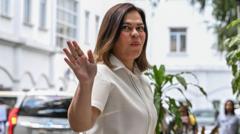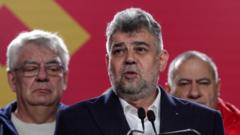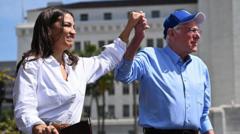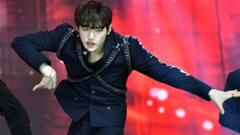With South Korea's democracy in a delicate phase post-impeachment of Yoon Suk Yeol, the candidates vow to bridge deep divides.
Presidential Candidates Aim for Unity Amidst Political Turmoil in South Korea

Presidential Candidates Aim for Unity Amidst Political Turmoil in South Korea
Lee Jae-myung and Kim Moon-soo prepare for a contentious election shaped by recent political upheaval.
In the midst of political upheaval, South Korea's upcoming presidential election pits two contenders against each other who embody the nation's stark divisions. Lee Jae-myung, the Democratic Party candidate, rose from humble beginnings as a teenage sweatshop worker to become a prominent political figure, capturing his party's nomination with 89.77% of the votes. His rival, Kim Moon-soo from the conservative People Power Party, has his own tumultuous history as a victim of political oppression during his time as an anti-government activist.
As South Korea approaches the June 3 election, the candidates are not just presenting their platforms but rather reflecting the sentiments of a population unsettled by the recent impeachment of former President Yoon Suk Yeol. Yoon faced backlash for his controversial martial law declaration and has left a fractured political landscape. The People Power Party, closely aligned with his ideals, has nominated Kim, who has notably rejected calls for accountability regarding the martial law situation.
Both Lee and Kim have encountered obstacles in their rise to candidacy, highlighting the uncertainty that has characterized South Korea’s political scene recently. Lee, advocating for a new era devoid of "insurrection and regression," is seeking to position himself as the unifying force in a divided nation, while Kim strives to solidify his conservative base. As campaigns ramp up, the ongoing struggle to heal a polarized society remains a daunting challenge for both candidates, shaping the narrative of an election that is as much about the past as it is about the future.
As South Korea approaches the June 3 election, the candidates are not just presenting their platforms but rather reflecting the sentiments of a population unsettled by the recent impeachment of former President Yoon Suk Yeol. Yoon faced backlash for his controversial martial law declaration and has left a fractured political landscape. The People Power Party, closely aligned with his ideals, has nominated Kim, who has notably rejected calls for accountability regarding the martial law situation.
Both Lee and Kim have encountered obstacles in their rise to candidacy, highlighting the uncertainty that has characterized South Korea’s political scene recently. Lee, advocating for a new era devoid of "insurrection and regression," is seeking to position himself as the unifying force in a divided nation, while Kim strives to solidify his conservative base. As campaigns ramp up, the ongoing struggle to heal a polarized society remains a daunting challenge for both candidates, shaping the narrative of an election that is as much about the past as it is about the future.




















